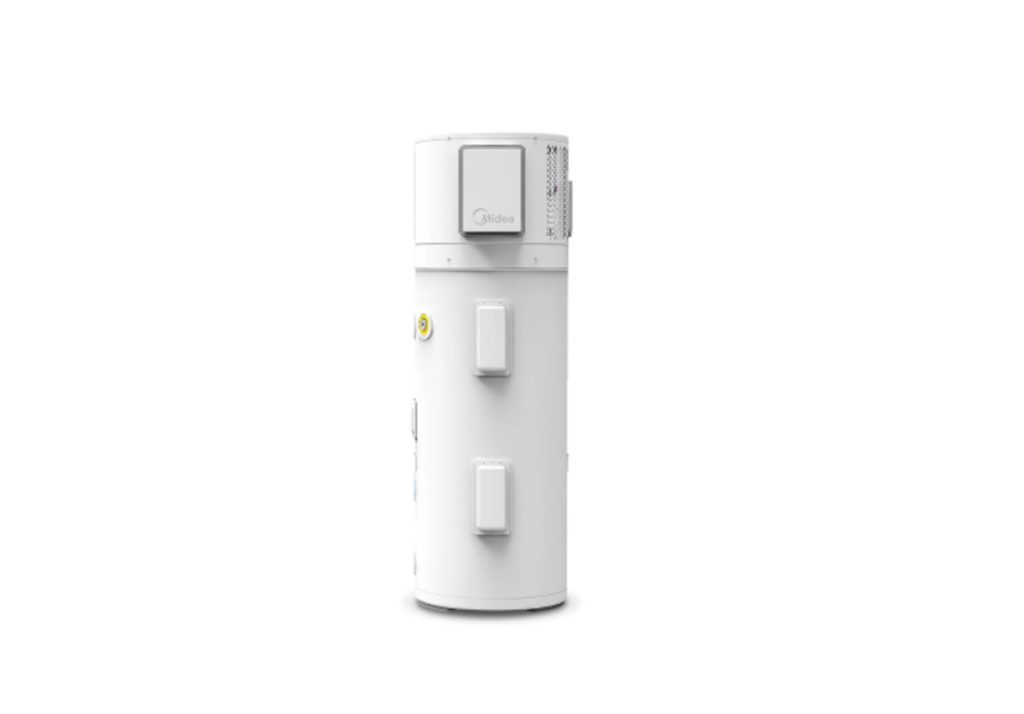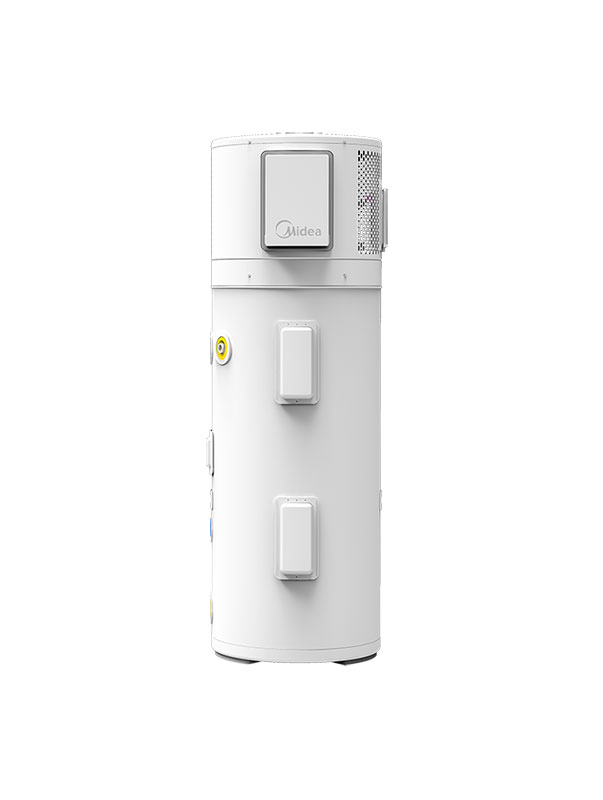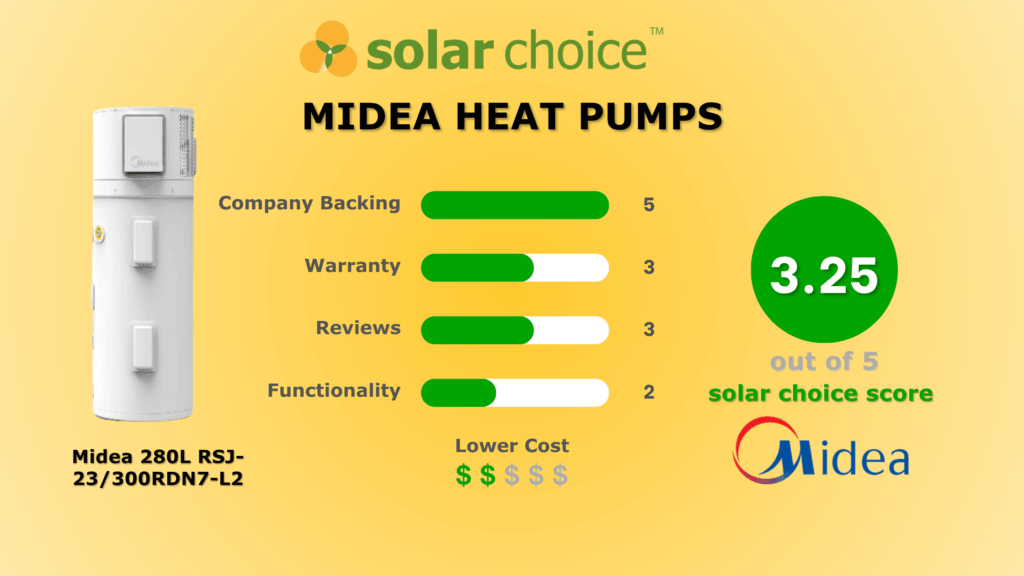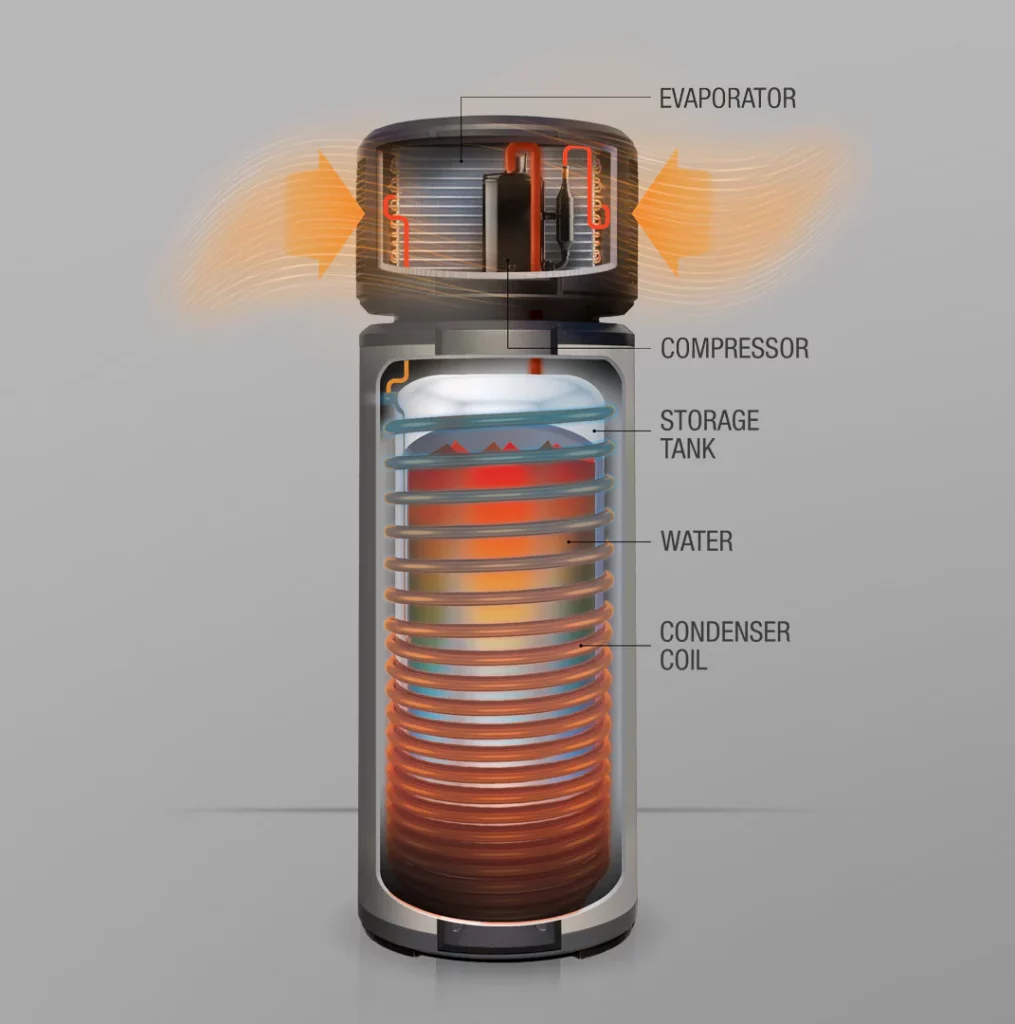At a Glance: Midea 280L RSJ-23/300RDN7-L2
Solar Choice Heat Pump Score = 3.5 out of 5
Scoring is based on the Solar Choice Heat Pump Scorecard, which is consistently applied to each brand and heat pump model available in the Australian market.
$$ Price: The Midea 280L SmartSaver model is priced between $2,300 and $2,800 (excluding installation and rebates). This places it in the lower cost category, offering strong affordability for medium to larger households.
- Company Backing and Trustworthiness: Midea is a global manufacturer with over 50 years of experience and a substantial presence in Australia, including staffed offices and warehouses in Victoria and New South Wales. The brand is diversified well beyond heat pumps, producing a wide range of appliances.
Score: 5/5 - Warranty Offer: The product is backed by a 7-year tank warranty, 5-year compressor warranty, and 2 years for labour and components. While competitive, this offer is less generous than some premium brands with extended labour terms.
Score: 3/5 - Customer Reviews: Based on verified reviews tracked through Solar Choice’s independent platform, Midea heat pumps currently hold an average score of 4.14 from multiple reviewers, earning it a solid performance tier for user satisfaction.
Score: 3/5 - Functionality: This model includes Wi-Fi and LCD controls, up to 6 programmable timers, and uses eco-friendly R290 refrigerant. However, the heating power is below 10W/L (8.9W/L) and the noise level is slightly above benchmark at 48 dB(A).
Score: 2/5
Company Background
Midea Heat Pumps Product Range & Availability
| Model | Tank Size | Household Size | Noise | Dimensions (mm) | Weight |
|---|---|---|---|---|---|
| RSJ-15/190RDN7-L2 | 170L | 2–3 people | 47 dB(A) | 552 × 552 × 1692 | 95.5 kg |
| RSJ-23/300RDN7-L2 | 280L | 3–5 people | 48 dB(A) | 650 × 650 × 1962 | 138 kg |
Notes for Buyers
- Noise: Midea units operate at 47–48 dB(A), slightly above the quietest models on the market. This may be noticeable if installed near bedrooms or living areas.
- Heating Performance: The estimated heating power is approximately 8.9 W/L for the 280L model and 10.6 W/L for the 170L model. Only the 170L unit exceeds the industry benchmark of 10W/L, which generally indicates faster ‘hot water reheating performance.
- Controls and Features: Both models include Wi-Fi app connectivity, a built-in LCD display, and support up to 6 programmable timer periods per day.
- Installation Tip: Ensure the unit is installed on a stable surface with adequate clearance, and confirm compatibility with a standard 10 Amp power point. Units are compatible with solar PV systems and support auto/manual disinfection cycles.
How Much Do Midea Heat Pumps Cost?
| Model | Tank Size | Estimated Price Range | Scorecard Price Tier |
|---|---|---|---|
RSJ-15/190RDN7-L2 | 170 litres | $2,000 – $2,500 | $ Lowest Cost |
RSJ-23/300RDN7-L2 | 280 litres | $2,400 – $2,800 | $$ Lower Cost |
With generous rebate programs in Victoria, NSW, and other states, eligible households can cut upfront costs by $1,000 or more, depending on installer and location.
Warranty Terms & Conditions
Midea heat pumps sold in Australia are backed by a local warranty managed by MD Appliances Pty Ltd, the official distributor. The warranty applies to key residential models, including the RSJ-15/190RDN7-L2 (170L) and RSJ-23/300RDN7-L2 (280L), and complies with Australian Consumer Law.
| Component | Warranty Length |
|---|---|
| Hot Water Tank | 7 years |
| Compressor (Heat Pump) | 5 years |
| Labour & Other Components | 2 years |
View official warranty document (PDF)
Pros & Cons of Midea Heat Pumps
Pros
- Lower upfront cost: Priced between $2,400–$2,800, making it one of the more affordable 280L heat pumps in Australia.
- LCD & Wi-Fi enabled: Includes LCD interface and app control with up to 6 programmable on/off timers.
- Uses R290 refrigerant: High-efficiency, low-GWP refrigerant for better environmental performance.
Cons
- Slightly noisy: 48 dB(A) noise level is above the quietest tier; may not be ideal near bedrooms or living areas.
- Heating power below benchmark: Delivers 8.9W per litre, under the 10W/L efficiency benchmark used by Solar Choice.
- Labour warranty limited to 2 years: Falls short of premium brands offering 5–10 years full coverage.
Verdict: Are Midea Heat Pumps Worth It?
However, there are notable limitations. Its heating performance falls below industry efficiency benchmarks, which could result in longer run times and potentially shorten the unit’s lifespan—particularly in colder climates. The unit also operates at a higher-than-average noise level, which may not be suitable in all installation settings.
- Stefan Grosjean | Smappee’s Vision, Smart EV Charging & the Future of Energy - 1 July, 2025
- Heat Pump Hot Water Systems Sydney & New South Wales | Buyers Guide - 30 June, 2025
- Best EV Chargers in Australia Compared (2025) - 30 June, 2025
Reviews from Australians who have installed Midea Heat Pumps
Review left 1 year after system installed
Wifi not installed on unit. Unable to connect to online management.
Two didn’t have remote holder had six put in can’t run all at once. Wasn’t told that when I ordered them
Nice clean product Will need to follow up in setting up electronic control
Unbelievable energy saving, it’s only consume about 3 KWh a day, if compared to the conventional electric element hot water system, it’s only use 1/5 of the power to keep the hot water on the sam size tank and sam temperature
Looks good ! No noise Very happy with the result
Never installed- cancelled the order - took too long.

